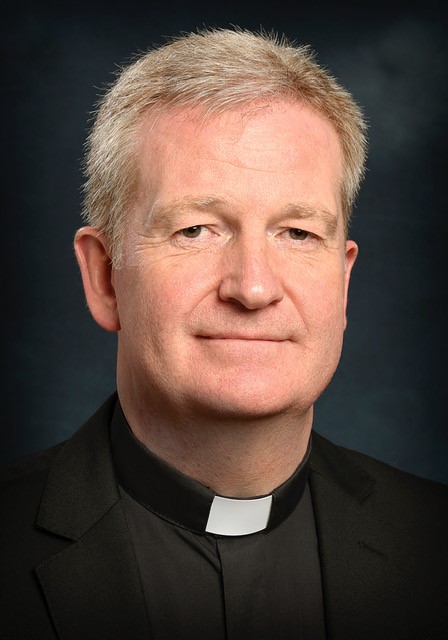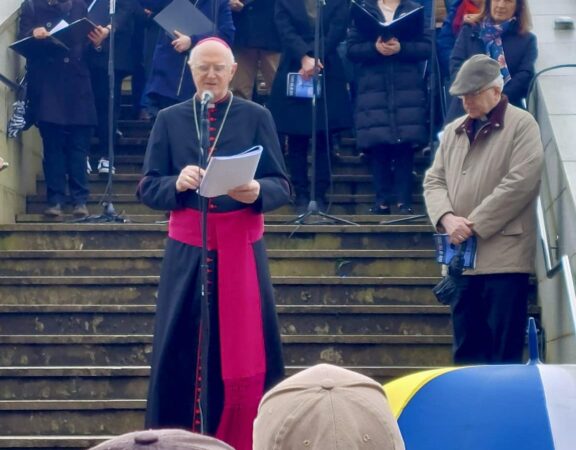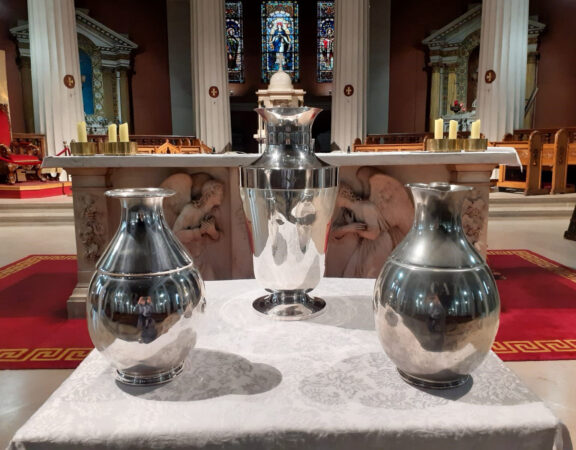Corpus Christi 2011
NATIONAL EUCHARISTIC CONGRESS
Speaking Notes of
Most Rev. Diarmuid Martin
Archbishop of Dublin, Primate of Ireland
—————-
Pro-Cathedral, 26th June 2011
We have come this morning to continue here in the Pro-Cathedral in Dublin our Irish National Eucharistic Congress which began yesterday at Knock Shrine. This morning we celebrate the Eucharist in each of the Cathedral Churches of Ireland as we prepare for the 50th International Eucharistic Congress which will be held here in Dublin in June of next year. We celebrate this Congress on the Feast of Corpus Christi, the Feast of the Body and Blood of Christ.
2012 will be the second time that we will have the privilege of hosting an International Eucharistic Congress in Dublin. The Official Crest of the 1932 Congress has been here in the Pro-Cathedral under the choir Gallery ever since. Indeed much of the current design of the building of this Church was put in place as the Cathedral was enlarged in the 1930’s to accommodate the great crowds who attended that Congress.
The 1932 Congress left a deep mark on the memory of the Church in Ireland and especially in Dublin. For generations families talked about what happened in the Phoenix Park and later at Benediction on O’Connell Bridge. My mother spoke especially of the life and the colour which pilgrims and Church dignitaries from all around the world brought to an otherwise humdrum Dublin in the years just after the great depression.
The 1932 Dublin Eucharistic Congress was a special event which fostered a sense of national pride but also of national unity at a time in which Ireland which was still divided and wounded by the terrible civil war which had taken place only years earlier. At the Eucharistic Congress for the first time people from both sides of the civil war came together in a common project. The 1932 Congress was a celebration of faith but also a celebration of healing and reconciliation.
There are those who would say that the 1932 Congress belongs however to a past era of Irish Catholicism and that it should be definitively consigned just to that past. There are some who would say that the very concept of a Eucharistic Congress belongs to a different era and is really no longer relevant to the life of the Church in Ireland today.
Certainly the religious culture of Ireland has changed over the decades since 1932. Much has happened in the intervening years, especially the Second Vatican Council. Our understanding of the Church and the Eucharist has been deepened. With next year’s Congress there is obviously no intention of replicating a Church of the past, much less attempting to restore in 2012 what took place eighty years ago.
But the Church in Ireland today also needs healing and reconciliation. The reality of the abuse of children which took place in Ireland and the manner in which it was dealt with has been a source of immense hurt for those who were the victims and survivors, but also for the members of the Church, lay people and priests, who feel betrayed and let down by their own Church. Many in today’s Irish society have lost confidence in the Church.
This occurs at the same time as the Irish Church and the religious culture in Ireland is changing under the effects of a secularisation of society. All of us – often unbeknown to ourselves – are exposed to a culture and style of life which can easily undermine our faith. We live in a culture marked by individualism also in our understanding of our faith. We feel that we can choose our own idea of who Jesus was and what Jesus demands of us.
The drop in regular Mass attendance is just one indication of the fact that we fail to understand the centrality of the sacraments in the life of the Church. The sacraments are not just places where we come to Church to “top-up” as it were at a source of grace. Neither are the sacraments just social or cultural events open to anyone as they wish. The sacraments are signs of the visible presence of Jesus in the life of the Church; it is the sacraments which build up the faith of the Church. They are celebrations of the entire Church which is the body of Christ and all the sacraments are essentially linked to the Eucharist, the body of Christ.
It is the Eucharist which builds up the Church making us the Body of Christ and therefore a people consecrated to God. The Church becomes People of God through becoming the Body of Christ and not through opinion polls within the Church or through some external sociological coming together. This is why any renewal of structures in the Church can only be attained within the context of renewal of faith and of sacramental life.
It is Jesus who shapes his Church. In the Eucharist, Jesus pours out his life for us. We are called to nourish ourselves with the bread of life and to drink the chalice of the new covenant. And we are called to witness to that covenant in our lives, through self-giving love and in the joyful hope that the Lord will come again to fulfil his reign of love.
There are those – as I have said – who would say that the 1932 Congress belongs to a past era of Irish Catholicism. There are some who would say that the very concept of a Eucharistic Congress belongs to a past era. There are also those today who may be tempted to think that the Eucharist itself is simply marginal in any project for the renewal of the Church. They fail to understand the Church.
From the beginnings of the Church the disciples gathered; they came together to listen to the word of God and for the prayers and for the breaking of bread. The Eucharist was the central and distinctive event of their lives as Christians. It was out of this coming together for the breaking of bread, however, that the disciples developed a particular life-style, a Eucharistic life-style, where having shared in the one Eucharistic bread they then shared all things among themselves and with those in need.
The Eucharist is not just a personal possession. It shapes a new form of living. I can never be a Christian just on my own uncaring and un-thoughtful about those around me or what is going on around me. A Eucharistic life-style is always one which reaches out to others, especially to those who may be in need or who are troubled. This is the sense of the theme of our Eucharistic Congress: “Communion with Christ and with one another”.
Our world is a world of contradictions. Social media and new technological means of coming closer to each other abound – and yet there is still much loneliness. Our interdependence as peoples and nations and economies is so evident, – and yet we still think that self-centeredness and political isolationism can protect us. The fragility of human solidarity is so evident as new conflicts and ideologies arise – and yet we find it difficult to embrace tolerance and respect for others. Our young people long for peace and the ability to realise their talents – and yet violence and exclusion still abound. What are we say about the repeated incidence of pointless and yet fatal violence that have marked this city, this very week? Where is such violence leading? What benefit does it bring to those who sponsor it, when they know well that their own nights will be sleepless and fearful? What are they saying to their children and their loved ones?
A Eucharistic life-style is one where the notions of caring and sharing dominate, where self-giving love is the mark of how we live, and how we base our choices and how we interact with others. The 2011 Eucharistic Congress will be an important moment when we can pause to reflect on what that life-style means. But it will be just one moment. If the Congress remains just an isolated moment then it will just be outward display.
The Church will be renewed only when believers in Jesus Christ truly come together regularly to listen to the word of God and to share in the bread of life and when from that nourishment they develop a new way of living and witnessing to their faith, in the Church and in society.
At the beginnings of the Church, as the Acts of the Apostles remind us: “Day by day, the Lord added to their number”. Today, the Lord will renew the Church and add to our number as believers in the measure in which we live that lifestyle which only our sharing in the body and blood of Christ can enable and foster. ENDS









